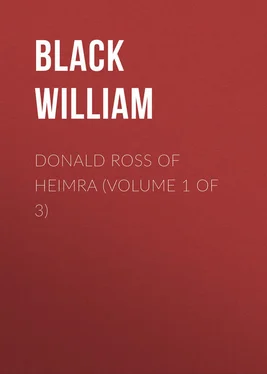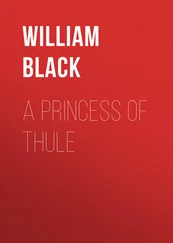William Black - Donald Ross of Heimra (Volume 1 of 3)
Здесь есть возможность читать онлайн «William Black - Donald Ross of Heimra (Volume 1 of 3)» — ознакомительный отрывок электронной книги совершенно бесплатно, а после прочтения отрывка купить полную версию. В некоторых случаях можно слушать аудио, скачать через торрент в формате fb2 и присутствует краткое содержание. Жанр: foreign_antique, foreign_prose, на английском языке. Описание произведения, (предисловие) а так же отзывы посетителей доступны на портале библиотеки ЛибКат.
- Название:Donald Ross of Heimra (Volume 1 of 3)
- Автор:
- Жанр:
- Год:неизвестен
- ISBN:нет данных
- Рейтинг книги:4 / 5. Голосов: 1
-
Избранное:Добавить в избранное
- Отзывы:
-
Ваша оценка:
- 80
- 1
- 2
- 3
- 4
- 5
Donald Ross of Heimra (Volume 1 of 3): краткое содержание, описание и аннотация
Предлагаем к чтению аннотацию, описание, краткое содержание или предисловие (зависит от того, что написал сам автор книги «Donald Ross of Heimra (Volume 1 of 3)»). Если вы не нашли необходимую информацию о книге — напишите в комментариях, мы постараемся отыскать её.
Donald Ross of Heimra (Volume 1 of 3) — читать онлайн ознакомительный отрывок
Ниже представлен текст книги, разбитый по страницам. Система сохранения места последней прочитанной страницы, позволяет с удобством читать онлайн бесплатно книгу «Donald Ross of Heimra (Volume 1 of 3)», без необходимости каждый раз заново искать на чём Вы остановились. Поставьте закладку, и сможете в любой момент перейти на страницу, на которой закончили чтение.
Интервал:
Закладка:
"Mr. Purdie," said Käthchen, interrupting – and with rather a cold manner – "was that your return for the old woman's kindness to you in your trouble?"
But he did not heed the taunt. He was exulting in his having trapped his enemy.
"She was frightened out of her wits, the wretched old creature. 'Donuil Og,' she says – Young Donald – it was from young Ross that she had got it. And now the case was clear enough! I had been suspecting something of the kind. And here was a fine come-down for the Rosses of Heimra; – the Rosses of Heimra, that in former days made such a flourish at the English court – dancing at Almacks, and skelping about wi' the Prince Regent; and now the last of the family come down to selling smuggled brandy to old women and a parcel of crofters and cottars! A fine way of earning a living! But it's all he's fit for – an idle ne'er-do-weel, that never did a turn of work in his life beyond poaching and thieving and stirring up ill-will behind one's back. But I'll be even with my gentleman! I'll have the Supervisor of Excise on to him; his fine little trips to the Channel Islands – I suppose it's the Channel Islands, where you get brandy for next to nothing – we'll soon put a stop to them; and when he finds himself before the Sheriff at Dingwall, he'll be singing another tune!"
A tap at the door – then Barbara entered; and the factor looked up quickly and suspiciously. But if the tall Highland lass had been listening her face said nothing.
"And the young man you speak of," Mary asked, "does he live all by himself – out on that island?"
"It's fit that he should live by himself," said Mr. Purdie, with his eyes beginning to twinkle fiercely again: for any reference to this young man seemed to completely turn his head. "He's nothing but a savage – brought up as a savage – amongst the rocks and crags – like a wild-goat – from his earliest years. What else could ye expect? There was his mother – a proud woman – proud and vindictive as ever was born – and she hears how her husband is gallivanting from this capital to that – throwing away his money on Italian countesses and riff-raff – indeed there was the one public scandal, but I cannot give ye particulars, Miss Stanley, the story is not for a young lady's ears at all: but the mother, she determines to go away and live in that island, and bring up her only child there; and there the two o' them live, like two savages, the laddie growing up as a wild goat would, clambering about the rocks and the shore and the hills. What could ye expect but that he should turn out a poaching, thieving, smuggling rascal, especially with every man, woman, and child in the place – on the mainland here, I mean – ready to serve him and screen him? Truly it is a debasing thing to think of – such supersteetion; but these poor ignorant creatures – a name's enough for them – any Ross of Heimra, because he's a Ross of Heimra, is a little God Almighty to them; I think they would perjure their immortal souls for that impudent and brazen-faced young scoundrel out there. Brandy? Oh, ay, brandy! And I dare say he gets them tobacco, too; and makes a good profit on't; for what else can he live on? Heimra island is the last of all their possessions; if you go scattering your money among Italian countesses, you've got to cut up the estate, and fling it into the market, bit by bit, until you come to the final solid lump of it – which your uncle bought, Miss Stanley; and then the deserted wife, left to herself on that island out there, can live on whelks and mussels if she likes! Well, a fine lonely place to nurse pride! Plenty of time to think! The great estate gone – her husband at length dead and buried without ever having come near her – and this young whelp to look after – a wild goat among the rocks! No more grandeur now – though at times Lord This or Lord That, or even a Duke or Duchess, would come in their steam-yacht, or send her presents of game in the autumn – "
"Poor woman!" said Mary. "Is she out there still?"
"No, no – her troubles are over," said the factor, with some expression of relief. "There's one the less for these ignorant, supersteetious creatures hereabouts to fall down and worship, as if they were golden images. She died near a year ago; and would ye believe it, this son o' hers, instead of having her put into a Christian graveyard, had her buried on the western coast of the island, up on the top of the cliff, and there's a great white marble slab there, that ye might see for miles off. A nice kind of thing, that! Refusing Christian burial for his own mother! He's just a Pagan, neither more nor less – a wild savage – fearing neither God nor man – getting drunk every night, I'll be bound, on that smuggled brandy; and I'm no sure he would scruple to take your life if he found ye in a convenient place. It's a terrible thing to think of, a human being brought up like that, in a country of law and order and releegion. But I've no pity for him, not one jot! He and his have done me sufficient harm; but I'll be even with him yet – the cheat-the-gallows!"
Mary Stanley, though not much of a coward, seemed to shrink back a little in unconscious dismay. She had never seen such venomous rage working in any human creature's face; and it was rather an appalling kind of thing. But presently Mr. Purdie seemed to recollect himself; this exhibition of overmastering hate was not the best means of propitiating his new mistress; and so, making a determined effort to control himself (and helping himself to another glass of sherry at the same time) he proceeded to talk of business, with a certain constrained, matter-of-fact air.
"You said before we came in to dinner, Miss Stanley," he began, in his slow and deliberate way, "that you wished fifteen years' of the dyke tax to be remitted and returned to the Cruagan crofters. Very well. Whatever is your pleasure. But have you considered what the result will be?"
"No," said Mary, "I do not wish to consider. I wish to have the thing done, because I think it is right."
"For one matter," said he, "they will take it, and not thank you."
"I do not care about that," she made answer. "We will see about the thanks, or no thanks, later on."
"But there's more," said the factor, rousing himself from his forced restraint of manner. "They'll just begin to think that the time for the universal getting of everything for nothing has come at last; and where will there be an end to their outrageous demands? The ignorant creatures! – they do not know what they want – they're like children crying for the moon; and they're encouraged by a set of agitators more ignorant than themselves – people in Parliament, and out of it, that never saw a peat-moss, and don't know the difference between a hog and a stirk – "
"But wait a moment, Mr. Purdie," said she, with some touch of calm authority. "I can hardly tell you yet what I intend to do; I have all kinds of enquiries to make. But every one is well enough aware that, whatever the cause or causes may be, there is great distress among the crofters – great poverty – and, naturally, discontent; and when I hear of them almost starving for want of land – and such immense tracts given over to deer – I know that a great wrong is being done. And that is not going to exist wherever I have a word to say."
"It cannot exist on this estate, Miss Stanley," the factor said, with confidence. "For we have not a single acre of forested land."
"What did I hear my brother say, then, about eleven stags in one season?" she demanded. "Why, he asked me to ask him up here this next autumn for the very purpose of going stalking!"
"Yes, yes, very likely," said the Little Red Dwarf, with the magnanimity born of superior knowledge. "The fact is that when the deer begin to get restless about the end of September and the beginning of October, a few stags and hinds come wandering on to our ground, between the Meall-na-Fearn and the Corrie-Bhreag mostly. But that is not forest; that is all under sheep; that belongs to Mr. Watson's sheep-farm: the stags the gentlemen get in the autumn are mere chance shots; we have not a bit of forested land. Indeed, Miss Stanley, ye'll rarely hear the crofters, in any part of the country, clamouring to have a deer forest split up amongst them; they know well enough what wretched and hopeless kind of stuff it is; they're wiser than the havering folk in Parliament. No, no; it's slices off the big arable and pasture farms they want. And I can tell ye this," he went on, in quite a reasonable way (for young Ross of Heimra was off his mind now), "there's many a proprietor in the Highlands would be willing and even glad to break up his big sheep-farms into small holdings; but where is either landlord or tenant to find the money to pay for the housing, and steading, and fencing; and where is the new tenant to find stock? To change the crofters into small farmers would be a fine thing, no doubt – an excellent thing, a great reform; and it would pay the landlords well if it were practicable. But how is it practicable? Before the scheme would work, the crofter would have to be given land worth at least £20 a year; and where is the capital to come from for stock and steading?"
Читать дальшеИнтервал:
Закладка:
Похожие книги на «Donald Ross of Heimra (Volume 1 of 3)»
Представляем Вашему вниманию похожие книги на «Donald Ross of Heimra (Volume 1 of 3)» списком для выбора. Мы отобрали схожую по названию и смыслу литературу в надежде предоставить читателям больше вариантов отыскать новые, интересные, ещё непрочитанные произведения.
Обсуждение, отзывы о книге «Donald Ross of Heimra (Volume 1 of 3)» и просто собственные мнения читателей. Оставьте ваши комментарии, напишите, что Вы думаете о произведении, его смысле или главных героях. Укажите что конкретно понравилось, а что нет, и почему Вы так считаете.












